Collaboration for the Nation: Philanthropy Contribution to Education in Indonesia

It is imperative to note that enhancing the nation’s intellectual capacity is a constitutional obligation that must be fulfilled. Given the diverse challenges, intricacies, and predicaments plaguing the education sector in Indonesia, the government requires the support of multiple stakeholders to expedite the improvement of educational standards and ensure equitable allocation of educational privileges. In this regard, the Indonesia Philanthropy Association (Filantropi Indonesia), the Tanoto Foundation, and the Education Philanthropy Cluster (EPC), initiated a joint publication that aimed to provide a comprehensive assessment of the prevailing conditions and issues in the Indonesian education sector.
This publication raised intervention, perspectives, challenges, best practices, and philanthropic support from philanthropic institutions who joined the EPC in the period ranging from 2018 to 2022. The EPC represents a collaborative platform for educational philanthropists affiliated with the Filantropi, boasting over 62 members. The philanthropic institutions’ diverse efforts to contribute to the education sector through practical implementation in the field have come to symbolize a beacon of hope, illuminating the path for the Indonesian nation in the face of diverse challenges.
In connection with the above, Filantropi Indonesia and the Education Philanthropy Cluste joined hands with the Tanoto Foundation to host the #60th Philanthropy Learning Forum (PLF) on the theme ‘Collaboration for the Nations – The Role of Philanthropy in Education‘. This event was part of a series at the Policy Forum on Education (PFoE) on December 13, 2023. This offline event was attended by 43 participants who were Filantropi Indonesia’s members and network associates.
During her welcoming remarks, Angginta Ayu, the Partnership Lead at Tanoto Foundation, emphasized that while the government is primarily responsible for providing quality education, the private sector, including philanthropic institutions and corporations, must also play a role. By fostering a strong public-private partnership to address various aspects of the education sector, we can accelerate improvements in education quality and equality in Indonesia. Hopefully, this publication and discussion would be a reference guide for the government, both at the central and regional levels, to design education policies that benefit all stakeholders, including partners, foundations, NGOs, CSR, academics, and individuals who wish to contribute to the betterment of education in Indonesia.
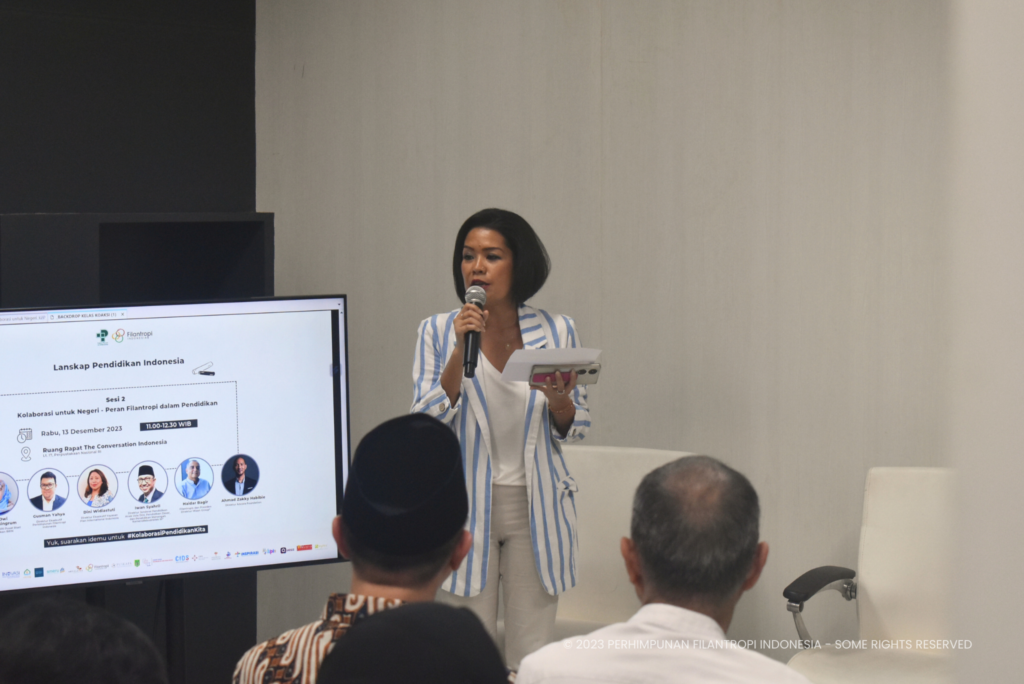
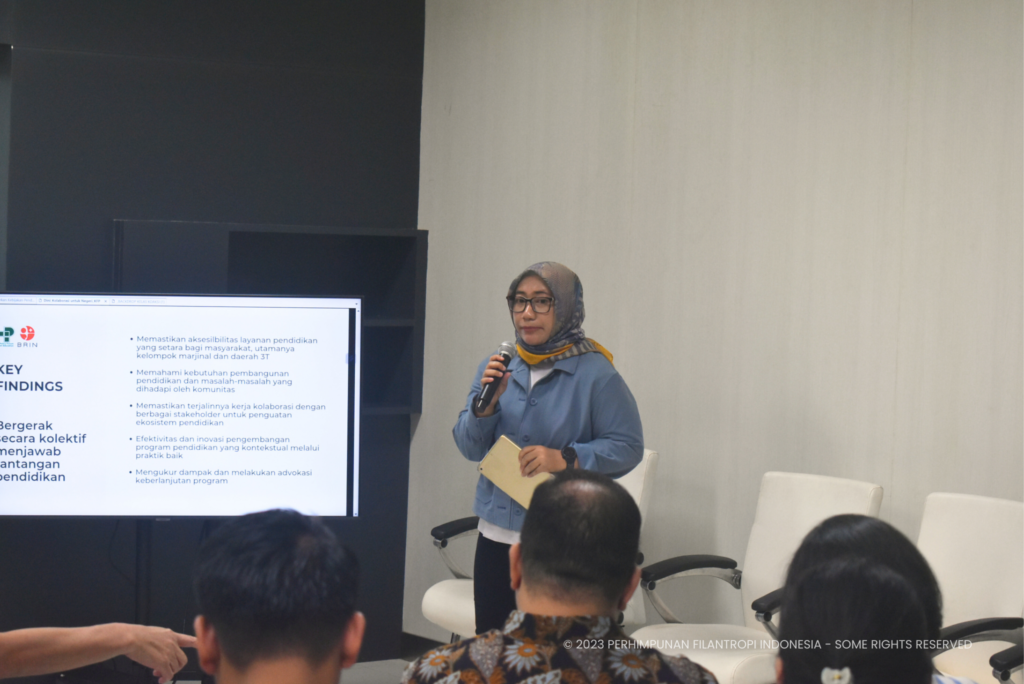
Dini Dwi Kusumaningrum, a Writer/Researcher at the BRIN Population Research Center, has expounded upon the significance of philanthropy in education in Indonesia. The publication highlights the collective efforts of philanthropy to address the challenges in the educational sector. Through interviews with multiple philanthropic institutions and desk research, the publication outlines five key contributions of philanthropy to educational development in Indonesia. These include ensuring equal accessibility to educational services for marginalized communities and those living in remote and underdeveloped areas, understanding the needs of the community for educational development and addressing the problems faced by them, establishing collaborative work with different stakeholders to strengthen the education ecosystem, developing contextual education programs through effective and innovative practices, and measuring the impact of programs and advocating for their sustainability.
In pursuing advancing and strengthening the education system in Indonesia, philanthropic institutions have greatly emphasized the awareness of education as a critical element in liberating and empowering individuals from marginalized conditions. This focus has been reflected in various educational programs designed to contribute to achieving the SDGs, particularly the goal of Quality Education.
In response, Iwan Syahril, Director General of Early Childhood Education, Basic Education and Secondary Education at the Indonesian Ministry of Education and Culture, has emphasized the importance of promoting this spirit of mutual cooperation. He recognized that the government’s role is not one of control but as an empowerer of the education ecosystem. As such, nodes in the ecosystem must work together and empower each other through collaboration with various sectors and stakeholders to achieve better results. It was not only the government that knew what was best for education, but rather a collective effort towards strengthening the education system in Indonesia.
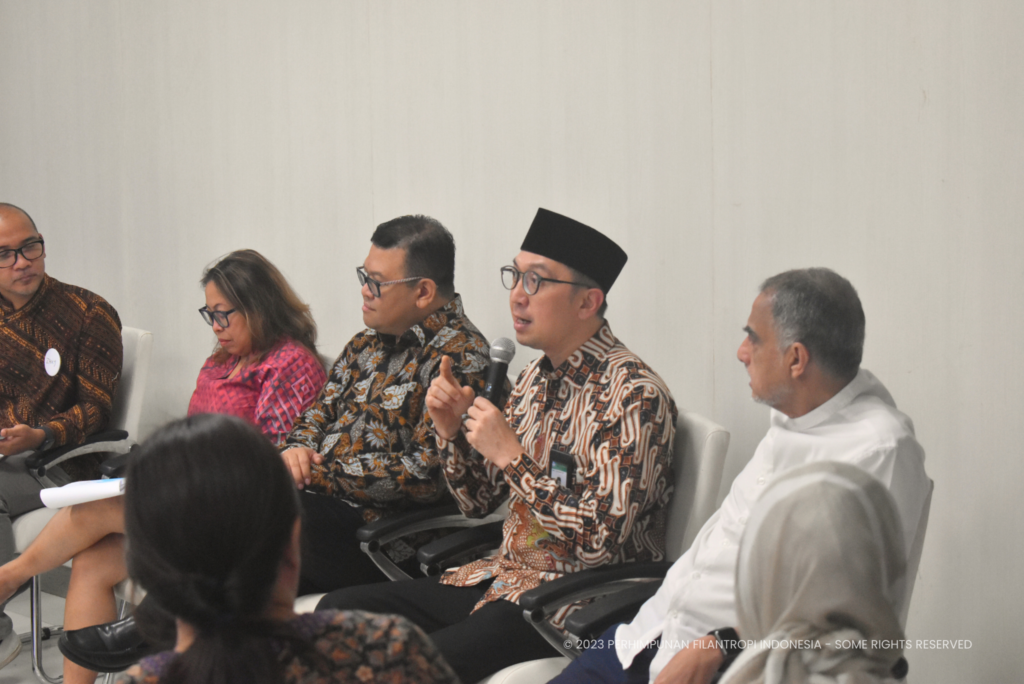
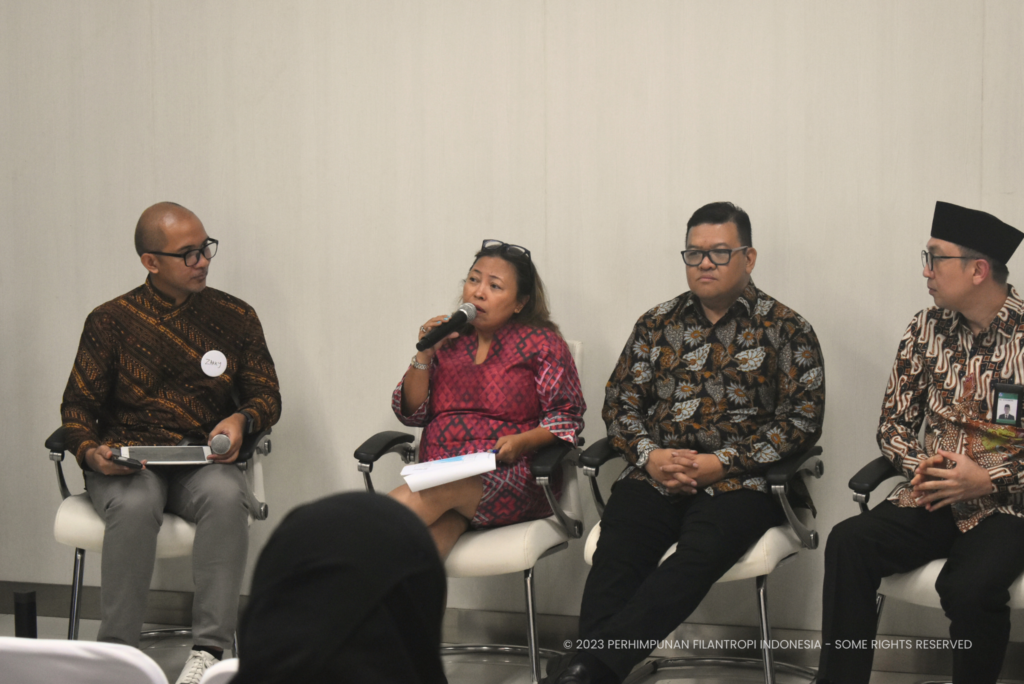
Dini Widiastuti, Executive Director of the Plan International Indonesia, has highlighted the challenges facing their organization in the realm of education in Indonesia. These challenges include economic barriers, wherein many parents need help to afford to send their children to high school or college, as well as cultural factors, wherein education was not viewed as a high priority due to a lack of perceived future benefits. Additionally, in certain regions, such as East Nusa Tenggara (NTT), students were forced to bring their own water to school since no water supply was available within a reasonable distance. This presents additional obstacles for students and may lead to reluctance to attend school.
Gusman Yahya, the executive director of Filantropi Indonesia, has acknowledged the significant role of the philanthropic sector in education in Indonesia. As the most generous country in the world for six consecutive years, Indonesia has seen education as the top priority program carried out by many philanthropic activists, as highlighted in the Indonesia Philanthropy Outlook 2022 report. Filantropi Indonesia continues to work towards strengthening the philanthropic ecosystem in Indonesia by promoting collaboration among its members and other sectors such as government, academics, media, and others.
The Educational Philanthropy Cluster consists of a diverse range of members, including grantmakers, intermediaries, and implementers, all working together to address educational challenges in Indonesia. Recognizing that this cannot be achieved alone, Filantropi Indonesia emphasizes the importance of collaboration with other sectors to overcome the challenges faced in achieving a golden generation in the future. The spirit of mutual cooperation is believed to be the key to solving not only educational challenges, but all problems that arise in Indonesia.
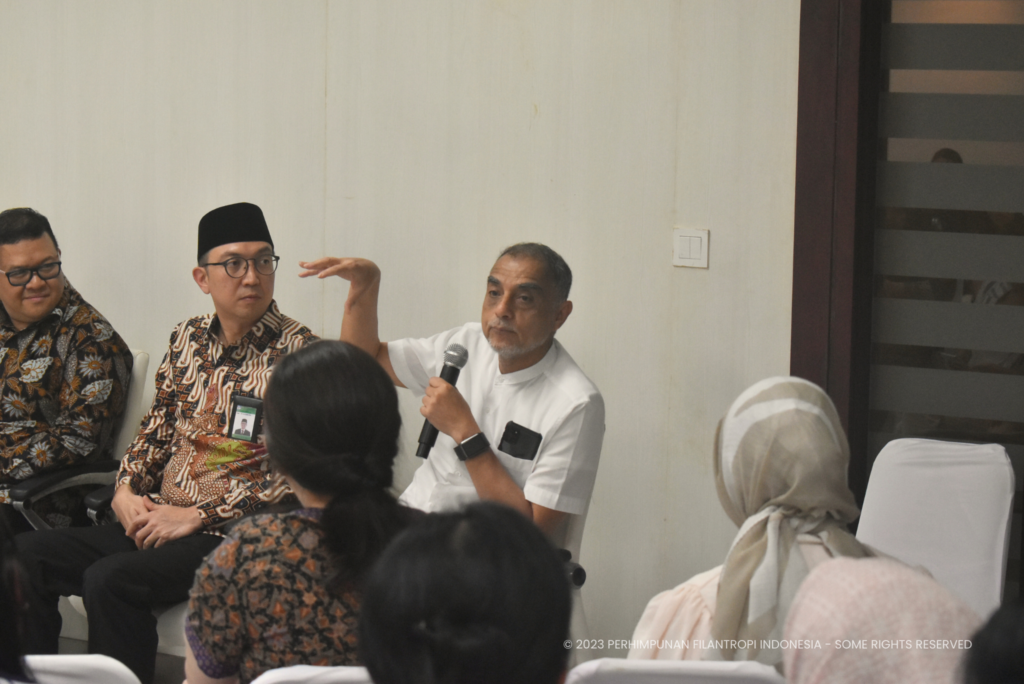
Haidar Bagir, an Education Observer and President Director of the Mizan Group, has highlighted a problem in the world of philanthropy regarding the positions of grantmakers, intermediaries, and implementers. Currently, philanthropic institutions avoid becoming intermediaries and instead prefer to be direct implementers. In some cases, even intermediaries have shifted their focus to become implementers. One suggested strategy to strengthen the philanthropy ecosystem is to increase efforts to encourage intermediaries to remain in their intermediary role and for those who have become implementers to shift back to an intermediary role.
These intermediaries can work closely with thousands, or even tens of thousands, of community philanthropies in all regions of Indonesia. By doing so, they can help solve problems within their own regions rather than relying on a technocratic approach that may need to be revised in its coverage of the issues facing Indonesia. This approach is expected to lead to more effective and impactful solutions to the challenges faced in the education sector and beyond.

